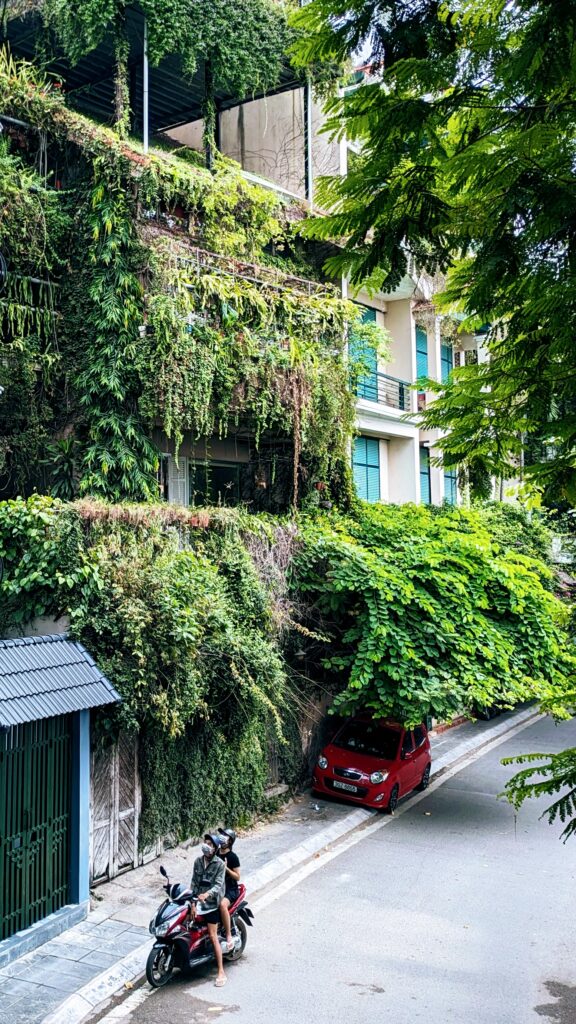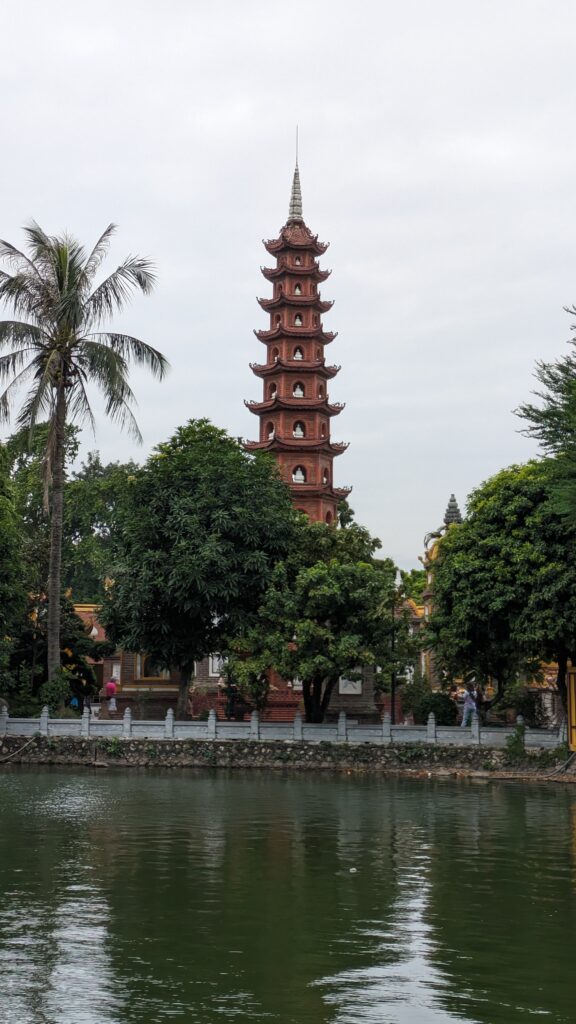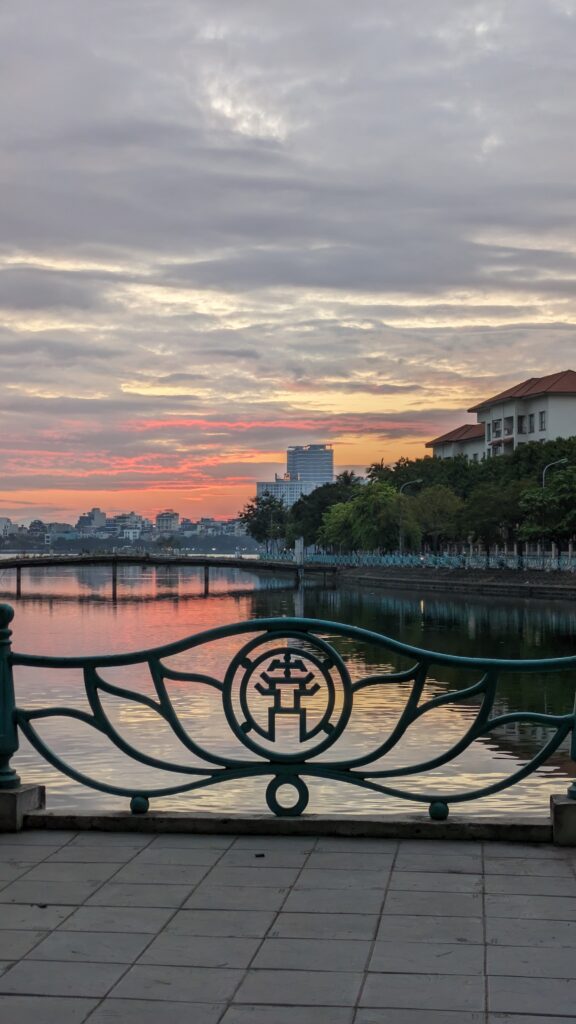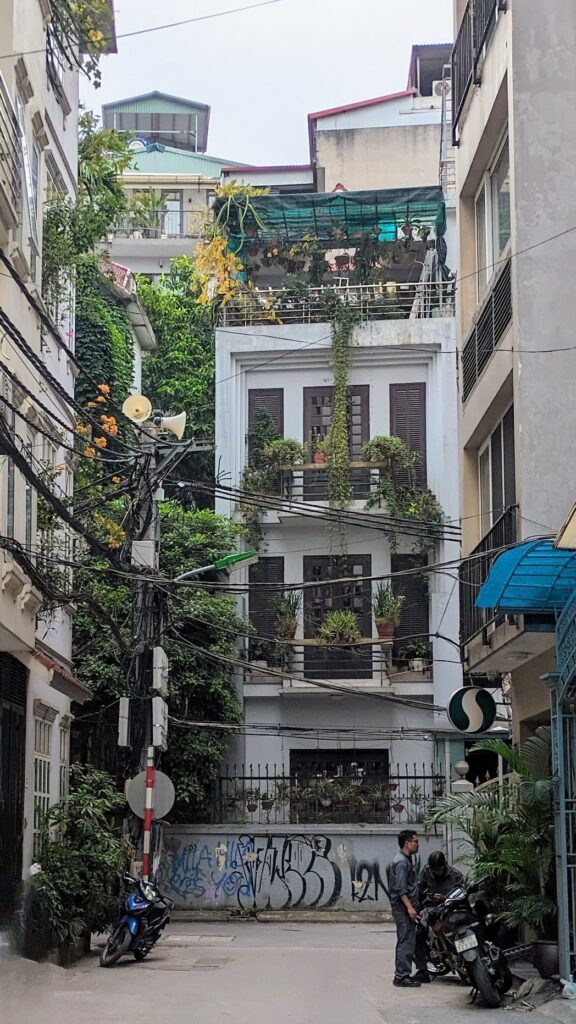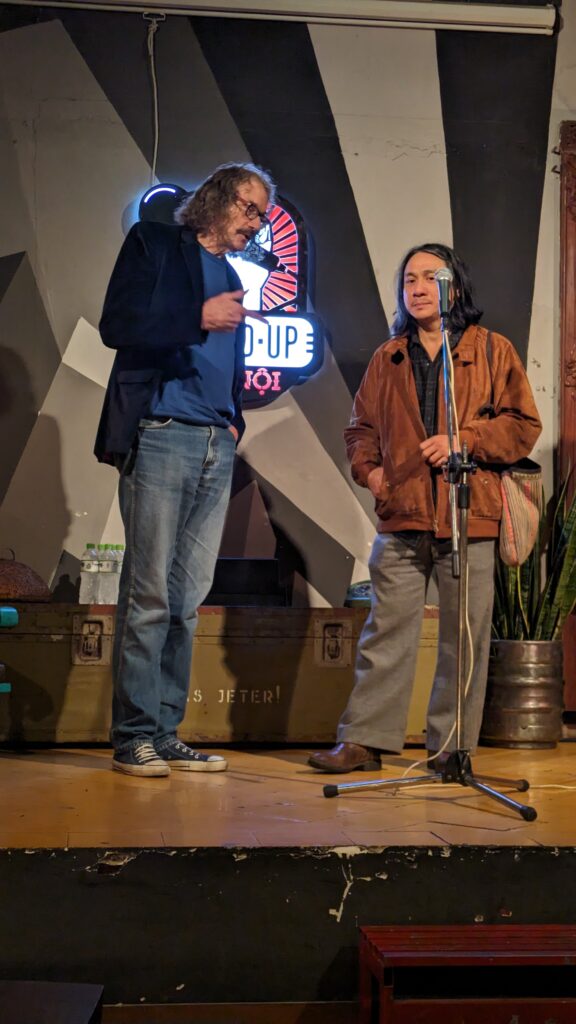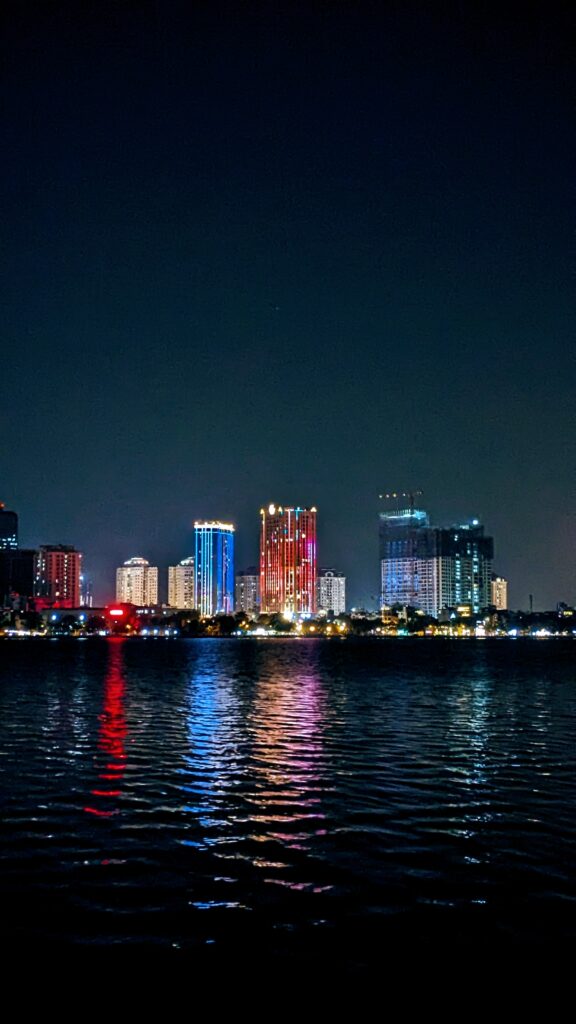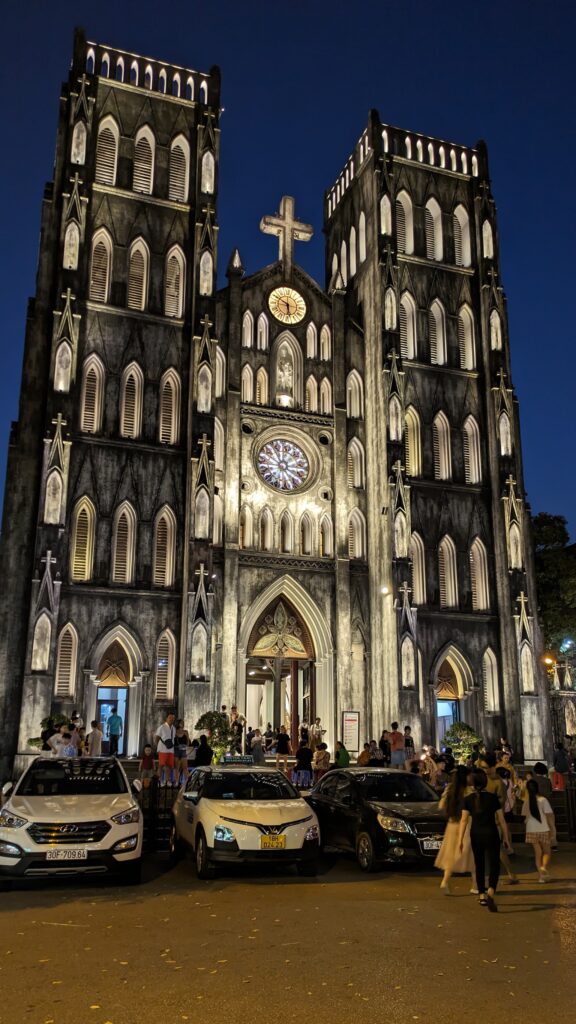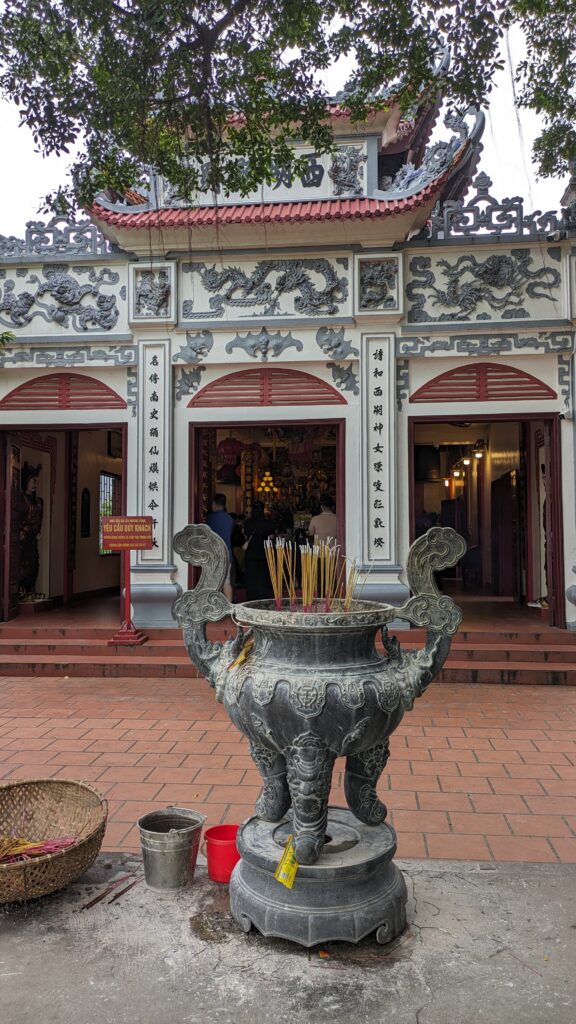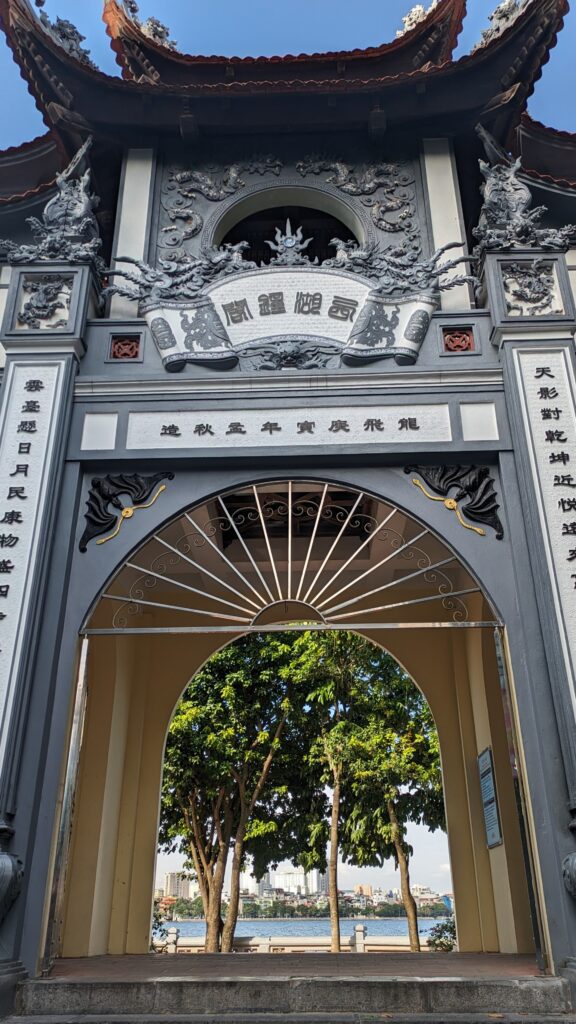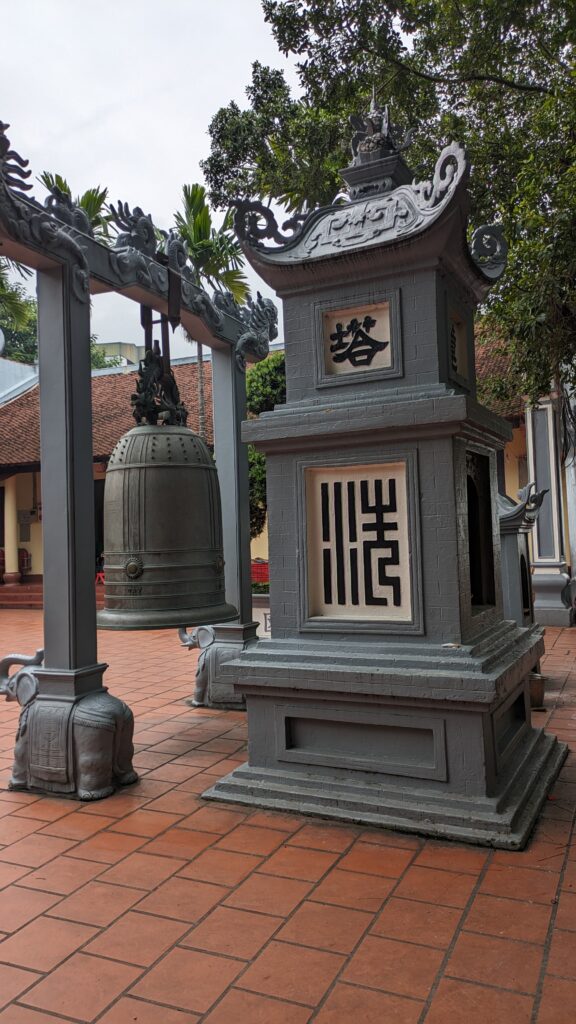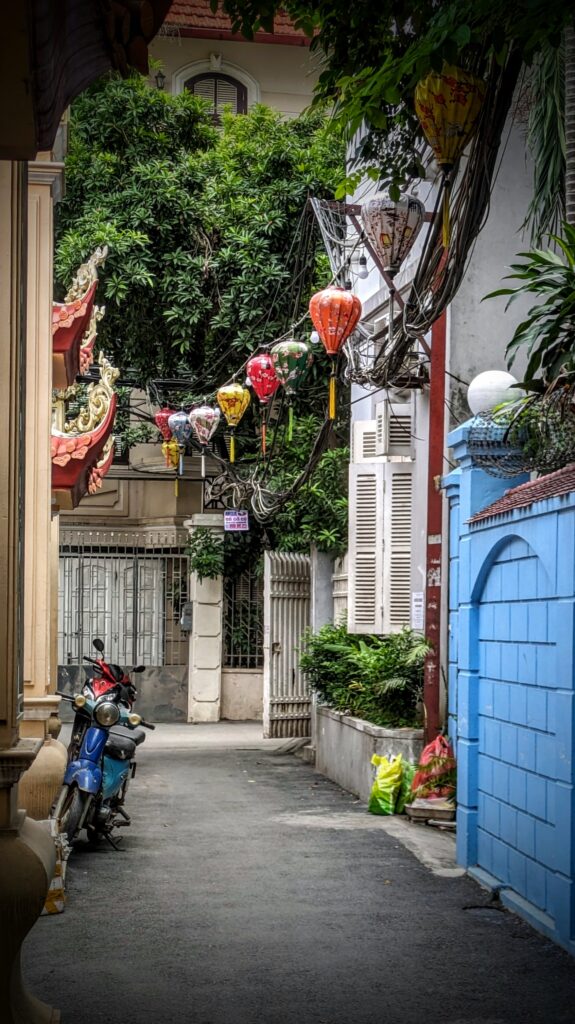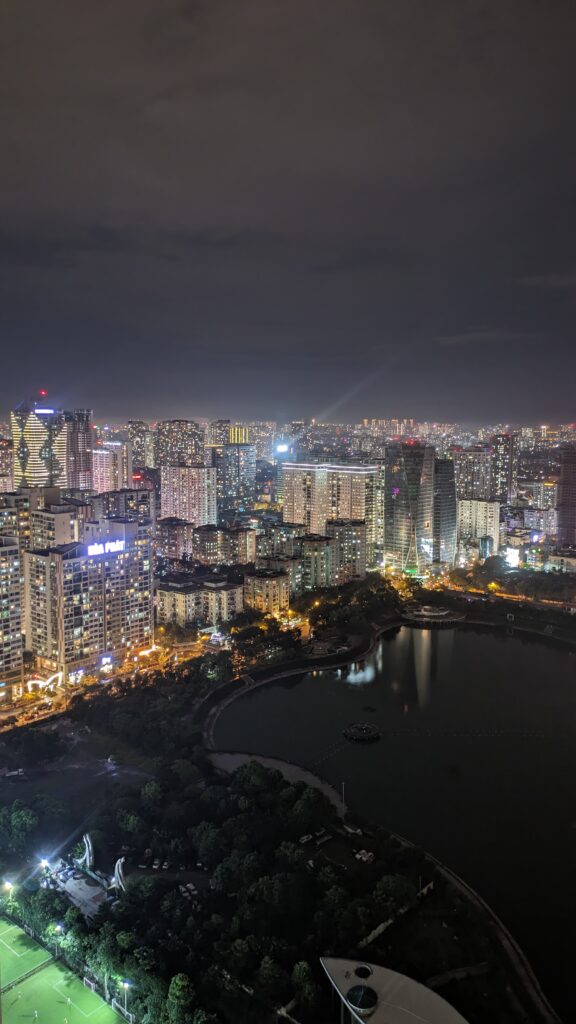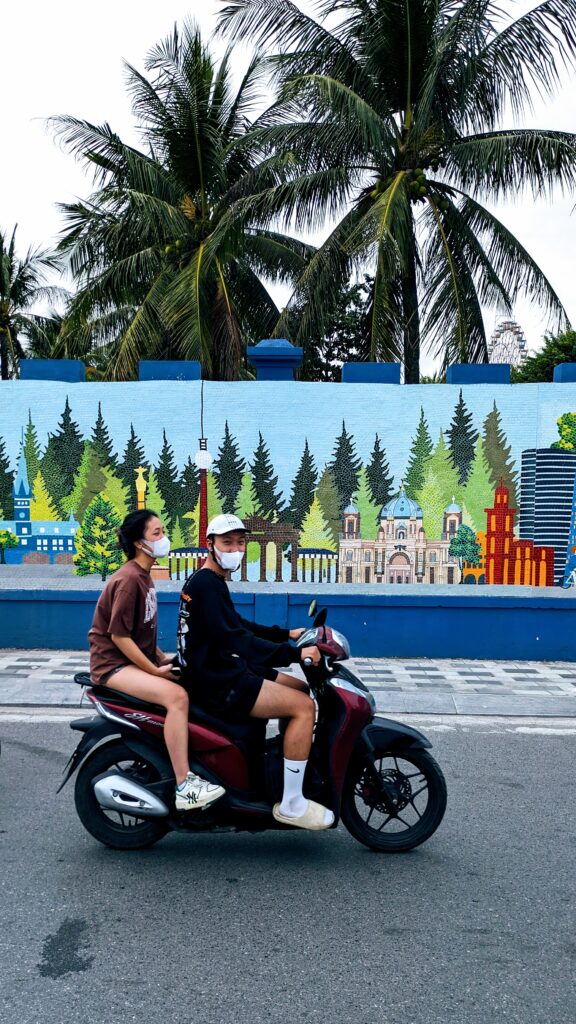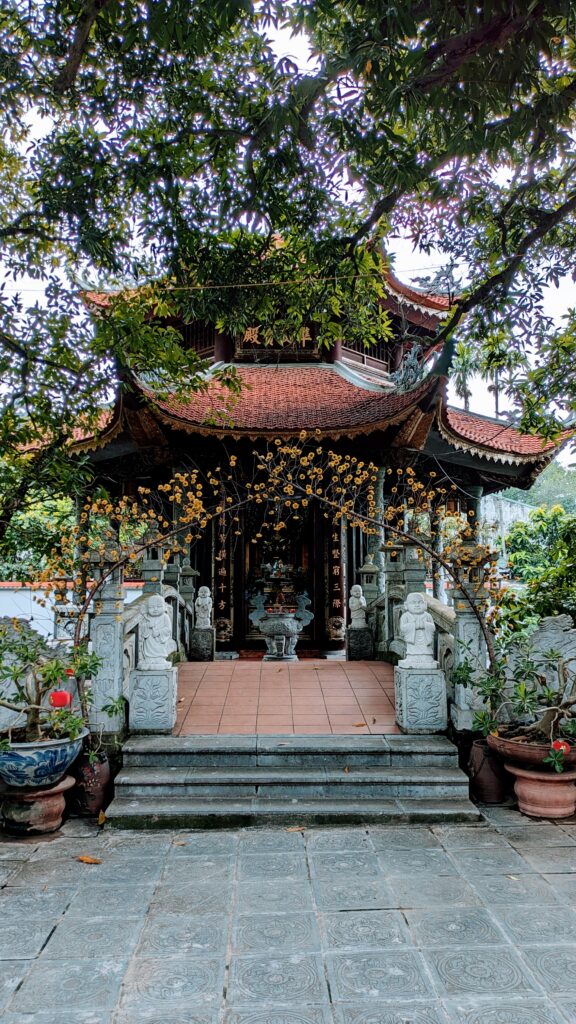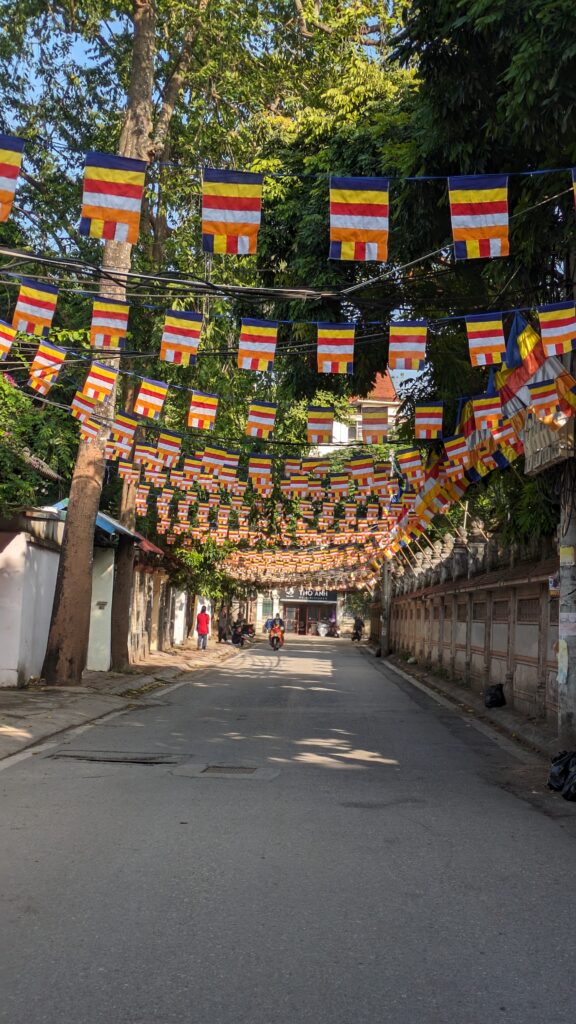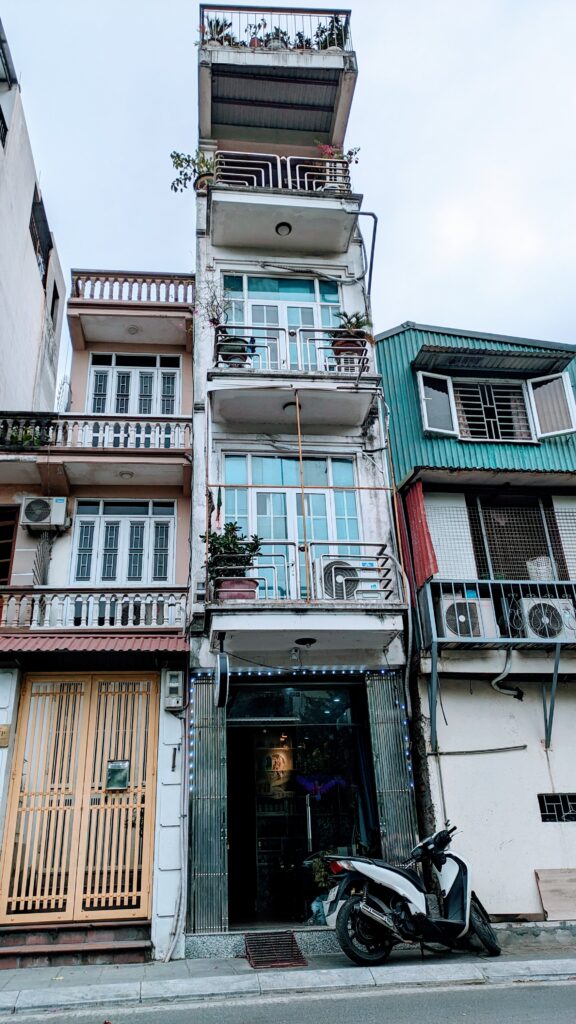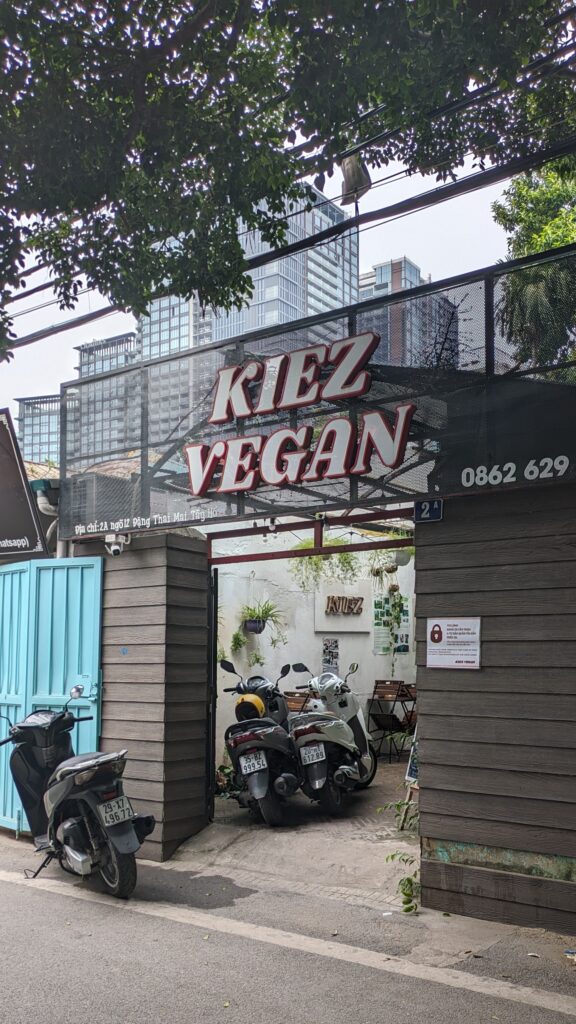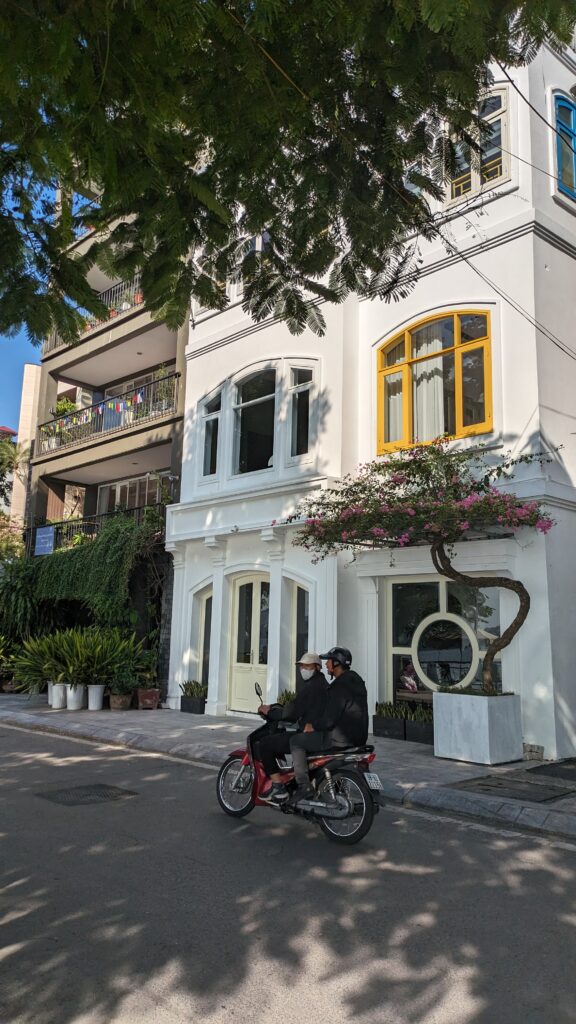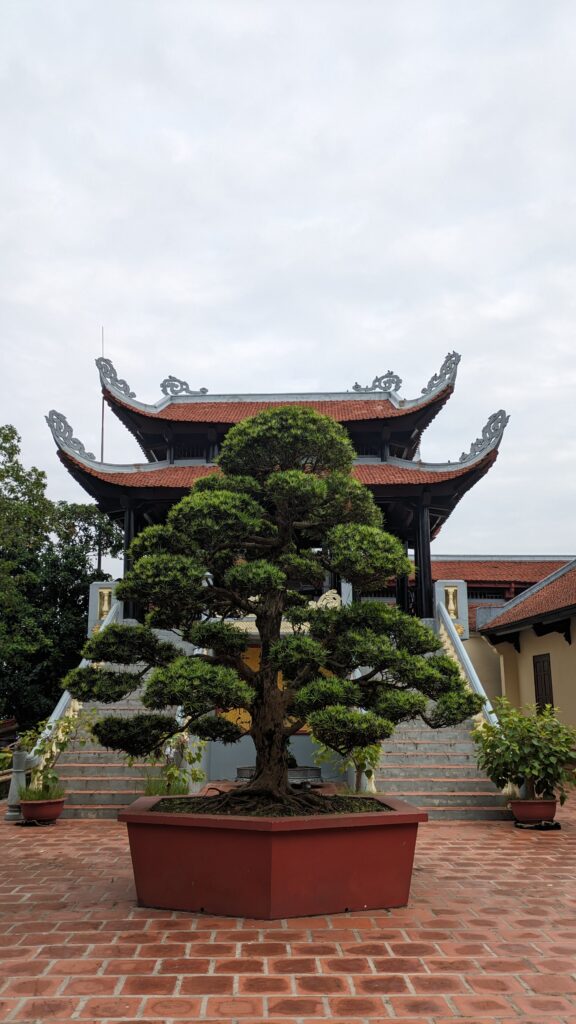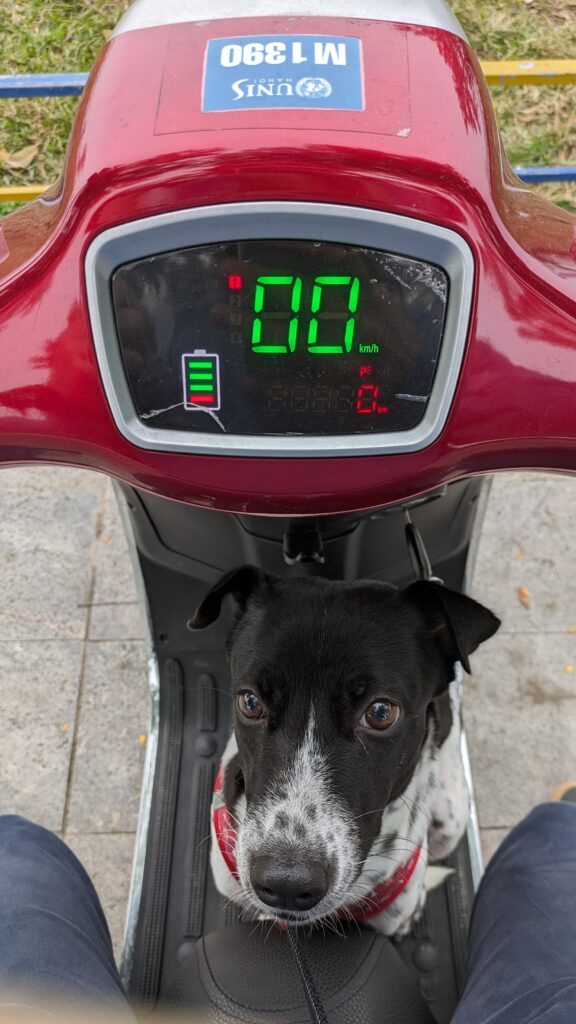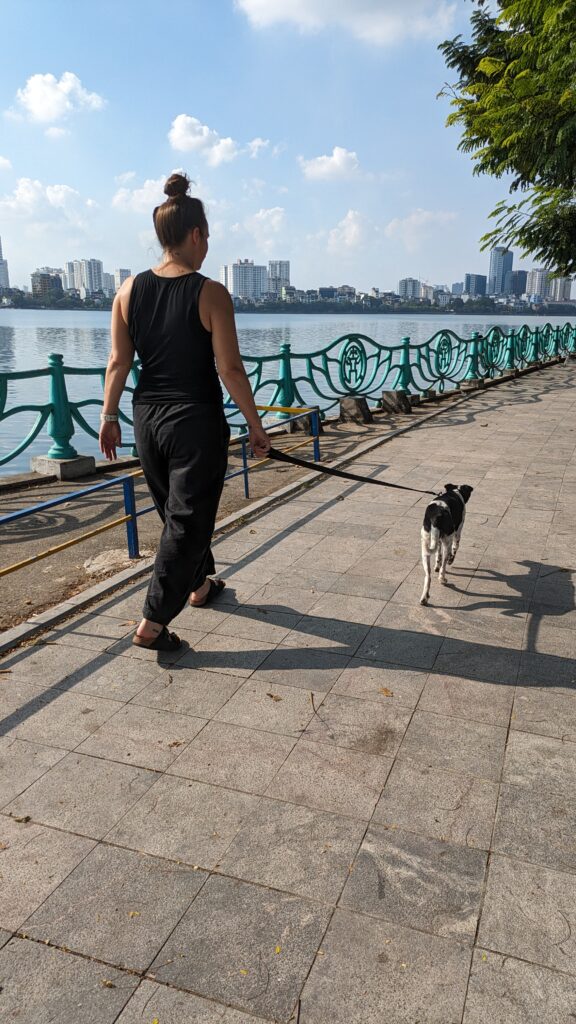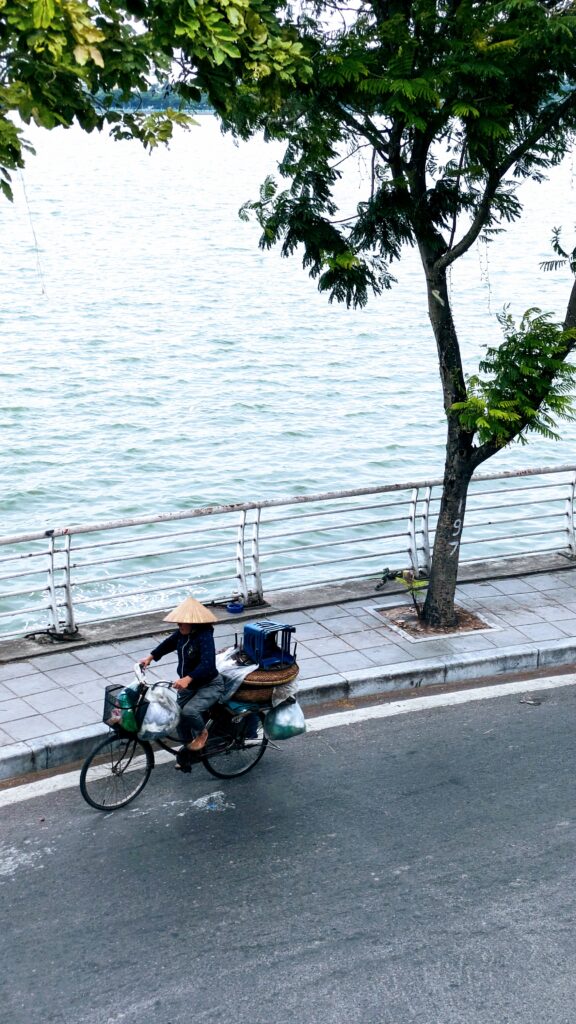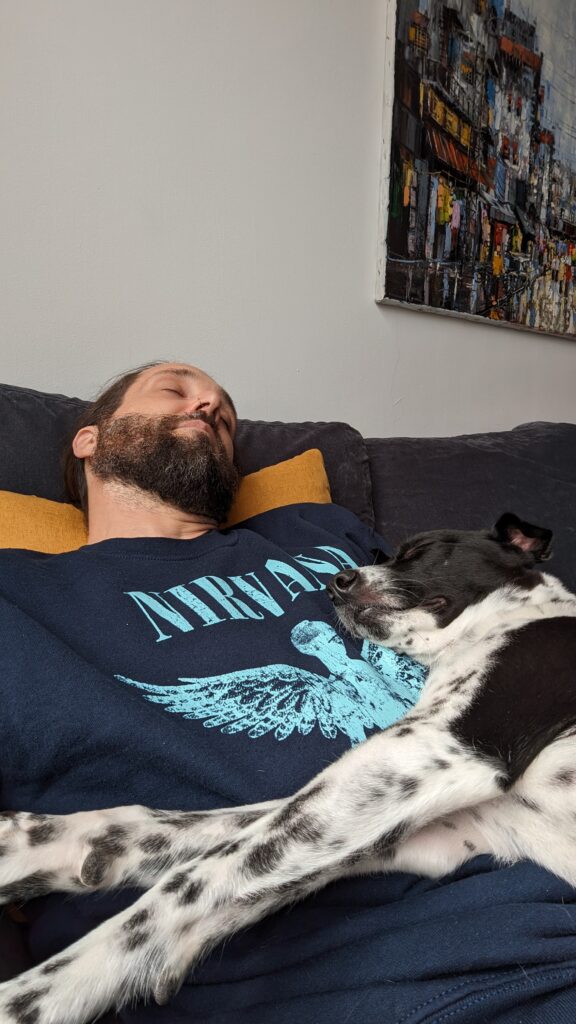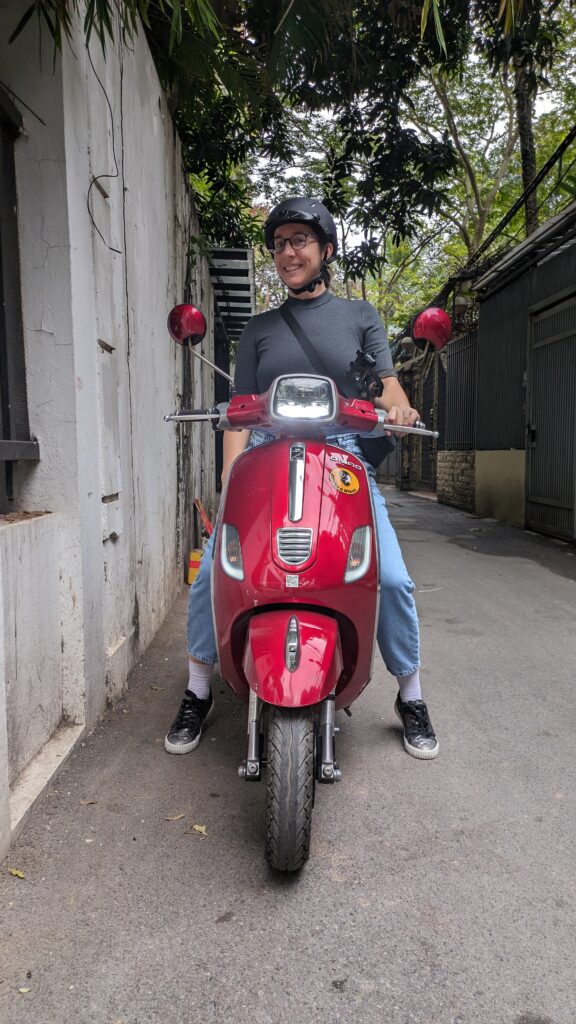was one of the titles Google’s Gemini AI suggested after I fed it this blog entry. I thought I would give it a try and see what AI has to offer. I don’t love it, but it’s not bad.
When arriving in Hanoi in mid-September, our first thoughts were that people seemed to be really friendly, something that held up throughout our stay. Basically the opposite of the average Viennese, who can be quite grumpy. It was extremely hot and the rainy season wasn’t completely over, but it almost was. We stayed in a high rise on the 45th floor in the Trung Hòa ward. Bee had taken up a position in Hanoi, so we were looking for a permanent home and planned to travel within Vietnam and to nearby countries like Korea, Japan, and Australia, places which I haven’t visited yet. That was the plan at least. Things turned out quite differently in the end!
The traffic in Hanoi is completely bananas, and there are over 6 million registered motorbikes. It’s sometimes almost impossible to cross a street because no one stops for pedestrians, and it takes quite a bit of courage to step into the never-ending traffic and trust that everyone will drive around you. As someone who grew up in a house with a garden in the very green town of Graz, I always strive to live on a quiet street without much traffic, even in big cities. I just can’t stand traffic noise. Since we were planning to stay for a long time, it was imperative for me to find an apartment in a quiet corner of Hanoi, if such a thing existed. And we did! We found a nice apartment on the third floor of a quiet, dead-end street in the Quảng An ward of the Tây Hồ district where we could literally hear the birds chirping in the trees next to our balcony.
The air quality can be terrible in Hanoi, depending on the day. One reason is obviously the traffic. Having one metro line (a second one is under construction) in a city of 8 Million isn’t enough. The other reason is that people constantly burn garbage, tree leaves and ceremonial items. On some days my clothes would smell of smoke just from a short walk in the neighborhood. We had to regularly close our balcony door because some neighbor was burning something again.
Hanoi’s tap water is unsafe to drink. We got our water delivered in big bottles like you might be familiar with from office settings. Only after leaving Hanoi did I realize how much I missed getting drinking water from the tap. Once, I also had a mild food poisoning, luckily it was not as bad as I remember it from India.
Tây Hồ is the district which surrounds West Lake (Hồ Tây) and is very popular with expats from around the world. This was also represented in our 6-floor building. The ground floor was occupied by a local, the second and sixth floors by French, the third floor by us, the fourth floor by British, and the fifth floor by Filipinos.
The percentage of expats from English-speaking countries like the US, the UK, Australia, and particularly South Africa seems to be very high in Hanoi. I would say that more than half of all expats teach English, anything from Kindergarten to university level. So it’s no surprise that many Vietnamese have an excellent command of the language. During a standup comedy show at the “Standing Bar”, which frequently hosts such shows and serves craft beers, a comedian asked, “Who in the audience is an English teacher?” Nearly everyone lifted their hand.
English is the lingua franca even in Vietnam, where the communist government didn’t have a positive relationship with the English-speaking USA in the past. Some people do attend French classes, just like people learn German in one of the Goethe Instituts I saw in every capital I have traveled to in the last two years. Six decades of colonial rule could not make Vietnamese francophiles: only 4% study French, while 86% study English, followed by 16% Japanese, 15% Chinese, 11% Korean. The practical reality of life is that English is just more commonly used the world over and therefore everyone wants to learn English because it opens the world to you. Vietnam is no exception to this.
Another global phenomenon, next to English being spoken everywhere to some degree, is of course the wide usage of mobile phones. Vietnam felt a bit more extreme though, people are constantly on their phones, even restaurant and shop employees often hardly lift their heads from looking at their phones and you see people riding their motorbikes and simultaneously reading on their phones all the time.
The density of restaurants in Tây Hồ from many culinary corners of the world is pretty impressive. I ate a lot of Indian food, which is among my favorite cuisines. The best craft beer in town we found at 7 Bridges Brewing Company in Tây Hồ. Our favorite Vietnamese craft beer was the “Dream Sensations”, a hazy IPA by the Heart of Darkness Brewery in Saigon. I stopped regularly for delicious cupcakes at BAKED AF (and friends) right on our street. I loved the vegan pho at Hamburg-inspired “Kiez Vegan” as well as their vegan döner, which I had more than once!
A major disadvantage of Hanoi is that sidewalks often don’t exist or are used for the parking of the 6 million motorbikes in town. We love walking places and while it was partly possible to do that in Tây Hồ, it was generally a big bummer to face so many hurdles while doing so. I, and everyone else who doesn’t enjoy running on a treadmill in a gym a lot, therefore, were running on the street. I would of course pick times and streets with very little traffic to do so. At first, I was a bit hesitant, but when I saw that a part from the locals many expats were also running on the street, I gave it a try. Motorized drivers usually kept enough distance and drove considerately.
In the beginning I used to order a Grab bike (South East Asia’s Uber) to commute to places, but I didn’t want to be dependent on the availability and driving skills of strangers on a daily basis since public transportation is often not a good option in Hanoi. You can rent motorbikes on a monthly basis for very little money, but I didn’t want to contribute to the already bad air quality of the city with another gasoline-powered motorbike. You see quite a few electric motorbikes on the streets, but for some reason it was more difficult to find a place that rented them out. I was therefore very pleased to learn that “Chicks n Bikes” was renting out electric motorbikes. Bee and I both got a Vespa-style electric scooter and enjoyed riding them a lot. If we both drove on the same bike, we could even have a long conversation amid traffic, since an electric bike is basically silent.
If we had lived in Hanoi for a long time, I would have bought a bike from the Vietnamese company Dat Bike. I test-drove their newest bike “Quantum” which accelerates so fast that my half-helmet almost came off my head. It has an incredible driving distance of 270 km / 168 mi in one charge in Hanoi conditions or around 200 km / 124 mi at 50km/h / 30 mi/h with a loaded weight of 70kg. I would consider the price of €1900 / $2050 to be more than fair. I think it’s just a matter of time before electric bikes like this will become the standard in many cities around the world if governments keep transitioning to renewable electric energy. I was astonished to read recently that Uruguay managed to change its entire electric system to renewables within just a few years. Austria generates 80% of its electricity from renewables, but unfortunately still relies on 16% gas, which shamefully is imported, for the most part, from Russia. It’s time to change that and not only for ecological reasons.
As a teenager, I drove a moped to school every day from the time I turned 16, but Bee never learned to drive a motorbike/scooter/moped and generally doesn’t enjoy driving much, even a car. To her surprise she loved driving her scooter in Hanoi. Hanoi traffic is so chaotic, and there are basically no rules. I would say the only rule is: Don’t hit others and try not to get hit. I was nervous before I drove for the first time, but immediately felt it was all very intuitive, even in the utter pandemonium of Hanoi traffic. I liked driving my scooter in Tây Hồ at times and on streets with less traffic, but I wouldn’t have enjoyed it if I had to drive regularly for longer distances. The chaos would get on my nerves and the air quality is horrible on busy roads. Nevertheless, one takeaway from our time in Hanoi is definitely the joy we found in riding our Vespa-like electric scooters. We could totally see ourselves driving in other places too, especially with less traffic and less air pollution.
Another much bigger and very real takeaway from Vietnam is our foster dog Gus. Two months into our stay in Vietnam, we took in a foster dog. We actually planned to give a home to a very old rescue who approached us during puppy yoga, organized by the local pet adoption organization and the yoga studio where I attended classes. Bee always wanted to provide a home to a rescue dog for the last few years of their life. Well, this dog was too old and died even before he came to us. Shortly after that the adoption center asked us if we wanted to foster a dog for 5 days while her foster went out of town. The foster was taking care of two more dogs and a few cats, and we thought we might as well take care of this dog for a longer period of time. We grew very soon very fond of her and when it was time to leave Hanoi couldn’t help but to take her with us. She is the sweetest dog ever and has gone through quite a lot in her short life. She is about a year old, so not exactly an old dog and a very long commitment. Gus was very skittish when she came to us, scared of humans, especially men, and other dogs. When she was young, a big dog bit her and broke one of her legs. The first few months of her life she was kept in chicken-wire cage and her sister was sold to be made into dog meat. She was then sent by train from Ho Chi Minh City to Hanoi to be taken care of by Hanoi Pet Adoption. In the beginning she didn’t even want to leave our apartment because everything scared her. Gus hardly played with any dog and mostly bared her teeth when being approached by dogs. Three months in, she loves to play with almost all dogs and lost most of her fear completely. She is bringing a lot of joy to us and we baby her ridiculously.
Walking Gus every evening through the streets of our neighborhood, we saw a lot of rats. In fact, I have never seen so many rats–and I’ve lived in both Paris & New York. We would see them among the piles of garbage that are left along the street to be picked up for collection. Littering is not helping the situation either. The carelessness towards nature is immense. Every kind of garbage is discarded everywhere, including inside the local pond near our apartment. When we arrived in Hanoi, there were a lot of dead fish floating in West Lake, which seems to be a regular occurrence happening every other year. The green space where most dog owners took their dogs, and to which I drove often with Gus on the scooter, was also completely trashed. Every day anew, people would carelessly throw waste on the lawn. Once I even saw someone from the local temple throwing a facial tissue right into West Lake as if it’s the most normal thing to do. As a buddhist I was shocked to see this, but how much has the temple life been hollowed out by the communist government who doesn’t care for the environment and even locks away environmental advisors after they helped them secure billions in foreign funding for a green energy transition?
One morning I read “Vietnam Pledges Human Rights Reform by Year 2099”, and I thought it was a headline for The Onion. That’s 75 years from now! I guess that’s what happens in a one party system: you have zero accountability. It’s a corrupt system and locals have to bribe officials during any interaction with government institutions to get things done, including a simple registration of a vehicle. They call that “speeding up the process”.
I was very lucky to find a good yoga studio in Tây Hồ not far from where we lived. I went for 3 1/2 months to at least 4 classes every week at New Mantra Yoga and enjoyed it very much. There is so much to learn from different teachers and each of them was very dedicated and did a great job. I twisted my body more than ever in different positions/asanas and realized that I can actually achieve much more in my practice by taking it so seriously.
Life was pretty good, we had a nice apartment in a quiet neighborhood, with many restaurants nearby, I attended lots of yoga classes and ate a lot of delicious vegetarian and vegan food, leading a pretty healthy lifestyle, apart from the occasional American comfort food and craft beer we consumed.
Why did we leave Vietnam after 4 months, without ever having seen any other part of the country?
The Vietnamese law firm that was supposed to handle the immigration work didn’t apply for the necessary permits until our 3 month Visa almost expired. They simply didn’t do anything. We got only a short extension and luckily were able to get all the documents ready in time to take Gus with us.
It was a BIG shock for us. We’d invested so many months of time, energy, and money into our move. We bought pieces of artwork for our home, Bee purchased and cared for nearly 40 different houseplants, we spent countless hours running around the city to get the essentials you need to make a house a home… and suddenly we had to give up everything and leave. Despite the immense frustration, I’m trying to not let the negative and abrupt end sour my memories of Hanoi. Vietnamese people are among the friendliest people I have encountered and they will stay in my heart!
